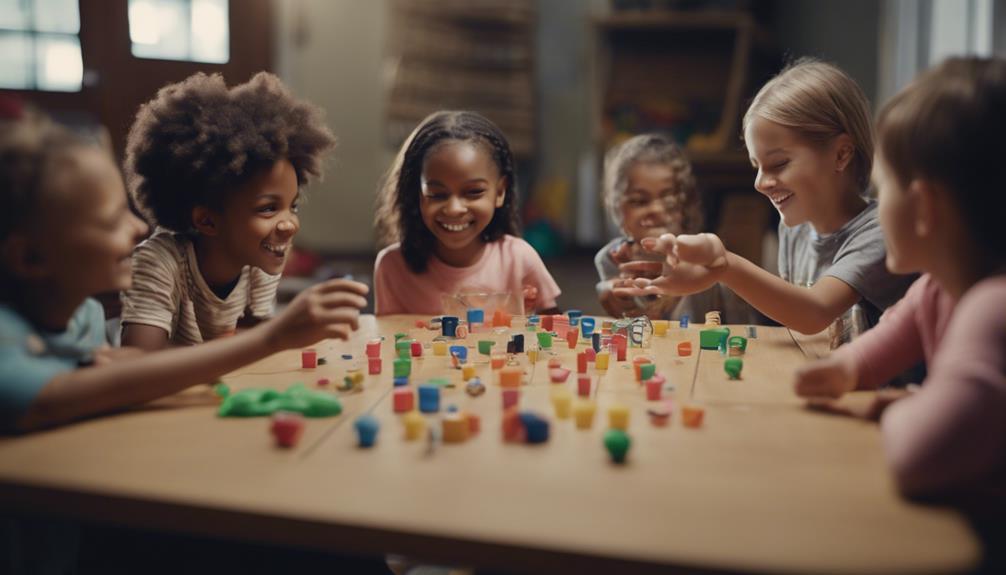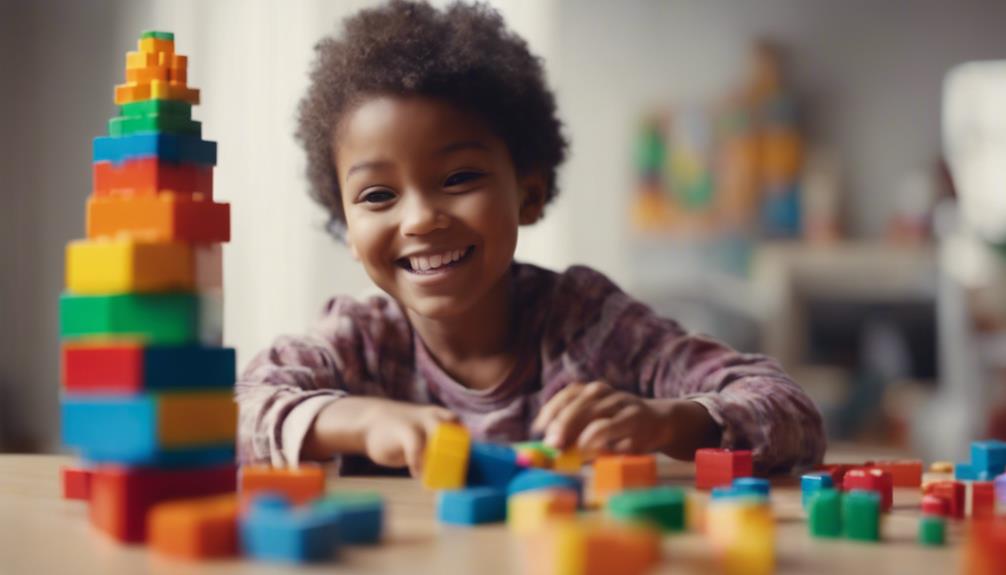To promote the development of cognitive skills in children, it is important to create environments that encourage exploration and problem-solving. Engage in activities such as memory games, puzzles, and educational toys to improve critical thinking and memory retention. Enhance observational skills through detailed activities like scavenger hunts. Develop cognitive flexibility by introducing diverse challenges that increase adaptability. Support milestones by reading together and asking open-ended questions. By exposing children to different stimuli and nurturing their curiosity, you can help them develop strong cognitive abilities. For more information on fostering cognitive milestones, refer to the strategies outlined in cognitive development research.
Key Takeaways
- Engage in interactive play to stimulate cognitive development.
- Provide educational toys and books for learning enrichment.
- Encourage imaginative play and ask open-ended questions.
- Read together to support cognitive growth and language development.
- Create stimulating environments to nurture cognitive milestones in children.
Importance of Cognitive Milestones
Monitoring cognitive milestones is vital for understanding a child's cognitive development and ensuring they're progressing appropriately. Cognitive milestones serve as important indicators of a child's cognitive skills, including cognitive flexibility, problem-solving abilities, and critical thinking aptitude. These milestones are pivotal in evaluating a child's developmental trajectory and identifying any potential delays that may require intervention.
Achieving cognitive milestones at the right ages is essential for a child's overall cognitive growth and preparedness for learning. By tracking these milestones, parents and educators gain valuable insights into a child's cognitive capabilities, enabling them to provide targeted support and activities to nurture further development. Recognizing and addressing developmental delays early on is critical to prevent long-term challenges in cognitive functioning.
Therefore, monitoring cognitive milestones not only enhances a child's academic performance but also contributes to the improvement of their social skills and overall well-being. It's through understanding and promoting these milestones that a child's cognitive potential can be maximized, setting a strong foundation for their future growth and success.
Stimulating Environment for Children
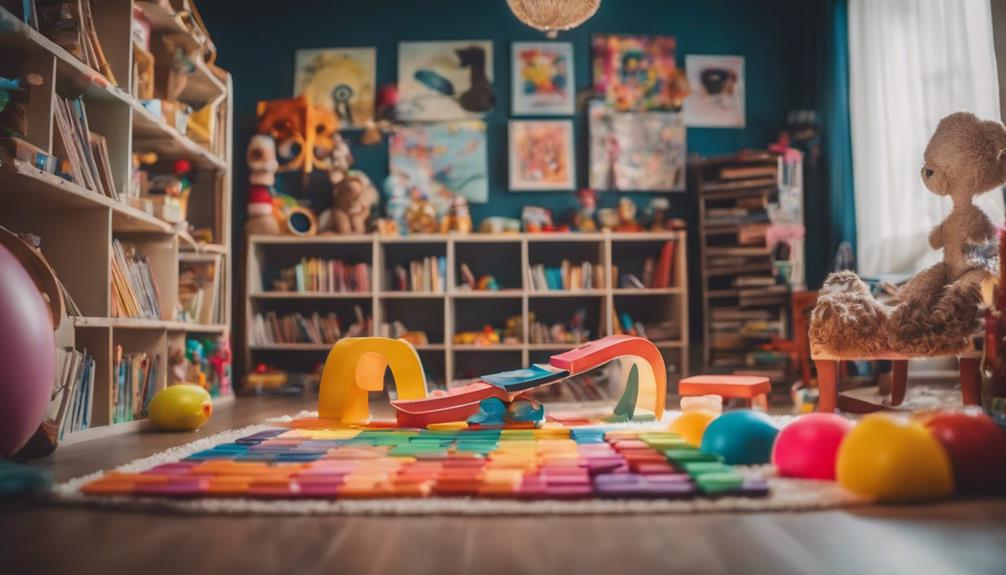
To support cognitive development in children, it's essential to create playful learning spaces filled with interactive educational tools. These environments offer opportunities for exploration and discovery, fostering a love for learning and enhancing cognitive skills.
Playful Learning Spaces
In creating a stimulating environment for children, playful learning spaces foster cognitive development through interactive and engaging experiences. These spaces are carefully designed to promote exploration, creativity, problem-solving skills, critical thinking, and overall child development. By offering a variety of cognitive challenges, playful learning spaces help children reach important developmental milestones. From interactive toys to educational games and hands-on activities, these spaces are filled with opportunities for children to enhance their cognitive skills.
| Benefits of Playful Learning Spaces | Description |
|---|---|
| Encourage exploration | Children are encouraged to explore and discover new things in a safe and stimulating environment. |
| Enhance problem-solving skills | Activities and games in these spaces help children develop their problem-solving abilities. |
| Foster critical thinking | Children are prompted to think critically and make decisions through engaging experiences. |
| Support developmental milestones | Playful learning spaces assist children in reaching important milestones in their cognitive and overall development. |
| Promote creativity and imagination | These spaces spark creativity and encourage children to use their imagination in various ways. |
Interactive Educational Tools
Interactive educational tools play an essential role in creating a stimulating environment for children, enhancing their cognitive development through engaging activities and games. These tools, such as memory retention worksheets and problem-solving strategy activities, are designed to stimulate critical thinking and problem-solving skills in children.
By utilizing cognitive skills assessment worksheets and attention span evaluation questionnaires, parents and educators can track children's progress in reaching cognitive milestones effectively.
Educational toys like building blocks, puzzles, and interactive games have been shown to promote critical thinking and spatial awareness in children, fostering their cognitive growth. Tools like memory assessment questionnaires and matching games further enhance memory, concentration, and overall cognitive development in kids.
Engaging in real-life questions, solving rebus puzzles, and playing Sudoku can also significantly boost cognitive skills and problem-solving abilities in children, providing them with a well-rounded cognitive development experience.
Enhancing Problem-Solving Skills
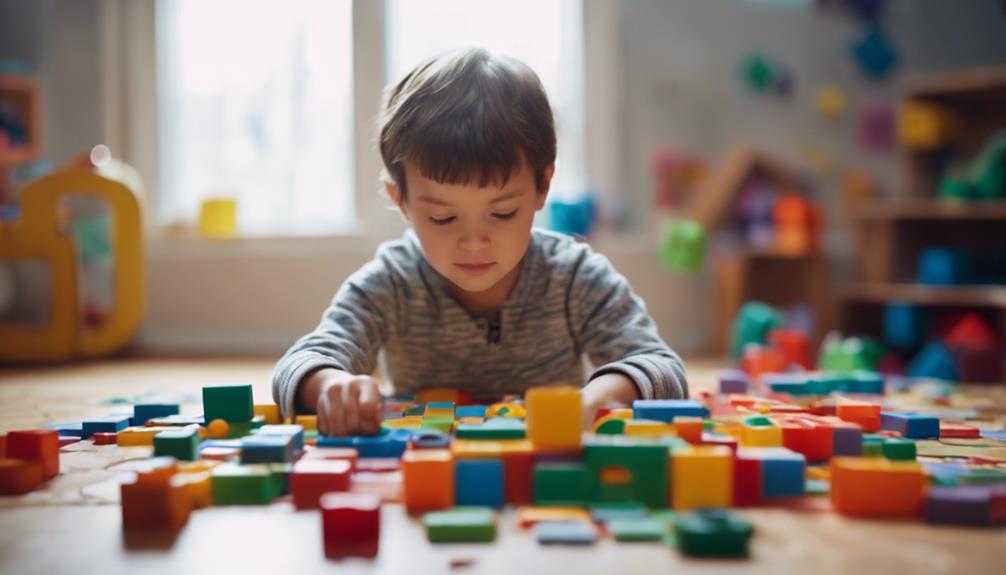
To enhance problem-solving skills in children, engaging in critical thinking activities, introducing puzzle games, and incorporating brain teasers can be highly beneficial. These activities not only stimulate cognitive development but also encourage children to think analytically and creatively.
Critical Thinking Activities
Engage your child in critical thinking activities to enhance their problem-solving skills and foster analytical thinking. These activities play an essential role in child development by promoting cognitive abilities such as memory, creativity, and spatial awareness.
Memory games, for instance, not only improve cognitive function but also enhance a child's capacity to retain and recall information effectively.
Board games are another excellent way to stimulate critical thinking skills in children, as they require strategic thinking and decision-making based on game rules.
Encouraging drawing and coloring activities can nurture creativity, an important aspect in developing innovative problem-solving approaches.
Additionally, building blocks are instrumental in honing spatial awareness, helping children understand spatial relationships and aiding in problem-solving tasks.
Introducing these critical thinking activities into your child's routine can greatly contribute to their overall cognitive development and problem-solving abilities.
Puzzle Games for Kids
Introducing puzzle games to children is a fun and effective way to enhance their problem-solving skills. These games play an important role in cognitive development, stimulating various skills such as spatial reasoning, critical thinking, pattern recognition, and logical thinking.
Here are some key benefits of incorporating puzzle games into your child's routine:
- Enhanced Problem-Solving Skills: Puzzle games require children to analyze, plan, and manipulate pieces to fit together, fostering their ability to solve complex problems.
- Improved Cognitive Abilities: Engaging in puzzle activities strengthens skills like spatial reasoning, critical thinking, and pattern recognition, essential for academic and real-world challenges.
- Boosted Confidence: Successfully completing puzzles instills perseverance, patience, and concentration in children, leading to a sense of accomplishment and enhanced self-esteem.
Brain Teasers for Children
Incorporating brain teasers into your child's routine can greatly enhance their problem-solving skills and cognitive abilities.
Brain teasers, such as puzzles and riddles, play a crucial role in fostering cognitive development in children. By engaging in brain teasers, your child can sharpen their critical thinking skills and enhance their problem-solving abilities.
These activities promote cognitive flexibility, boost mental agility, and stimulate neural pathways in the brain, leading to improved cognitive function. Brain teasers encourage children to think outside the box, promoting creativity and enabling them to explore various solutions to challenges.
Regular practice with brain teasers not only improves memory and attention span but also contributes to overall cognitive development in children. By offering a fun and engaging way to exercise the brain, brain teasers provide a platform for children to enhance their cognitive skills while enjoying the process.
Developing Memory Retention

Improving memory retention in children can be achieved through practice, repetition, and engaging activities. When focusing on developing memory retention in children, consider the following key strategies:
- Memory Games: Engaging children in memory games can make the learning process enjoyable and effective.
- Reinforcement: Consistent reinforcement of learned material through various methods can help solidify memory retention.
- Recall Practice: Encouraging children to actively recall and repeat information they've learned can strengthen their memory retention capabilities.
Fostering Critical Thinking Abilities

To further enhance cognitive development in children, fostering critical thinking abilities is essential to nurturing their analytical and problem-solving skills. Critical thinking skills in children involve analyzing information, reasoning effectively, and problem-solving, which can lead to better decision-making and enhanced cognitive development.
Activities like puzzles, memory games, and asking open-ended questions play a vital role in helping children develop these skills. By engaging in such activities that support critical thinking, children can evaluate information, make connections, and draw logical conclusions. This process not only enhances their problem-solving abilities but also allows them to develop a deeper understanding of concepts.
Encouraging critical thinking abilities in children from a young age sets a strong foundation for their cognitive development, enabling them to approach challenges with a more analytical and reasoned mindset. By fostering these skills, parents and educators can empower children to become independent thinkers who are capable of making informed decisions.
Observational Skills Development

Developing observational skills in children involves honing their ability to notice and gather information from their surroundings. These skills are essential for their cognitive development, allowing them to make connections, understand cause and effect, and recognize patterns. By encouraging children to observe and analyze their environment, you can support their cognitive growth and problem-solving abilities effectively.
Activities like scavenger hunts, I Spy games, and nature walks can improve children's observational skills significantly.
Observational skills play an important role in cognitive development by enhancing attention to detail and critical thinking.
By fostering a child's ability to observe, you can help them make connections between different elements in their environment, leading to better cognitive development.
Engaging children in activities that require keen observation not only sharpens their skills but also lays a strong foundation for their overall cognitive development.
Cognitive Flexibility Activities

Encouraging children to engage in cognitive flexibility activities can help them adapt to new situations and enhance their problem-solving strategies effectively. Cognitive flexibility activities, such as puzzles and brain teasers, challenge children to think creatively and explore various solutions, ultimately improving their ability to cope with changing circumstances.
Engaging in pretend play where children take on different roles can also promote cognitive flexibility and enhance their perspective-taking skills.
Introducing games that require switching between tasks or rules can further enhance cognitive flexibility and mental agility in children. By providing opportunities for children to make decisions and solve problems in diverse ways, parents and educators can help strengthen their cognitive flexibility and adaptability.
These activities not only encourage children to think critically but also foster skills essential for handling complex situations in both academic and social contexts.
Supporting Cognitive Milestones
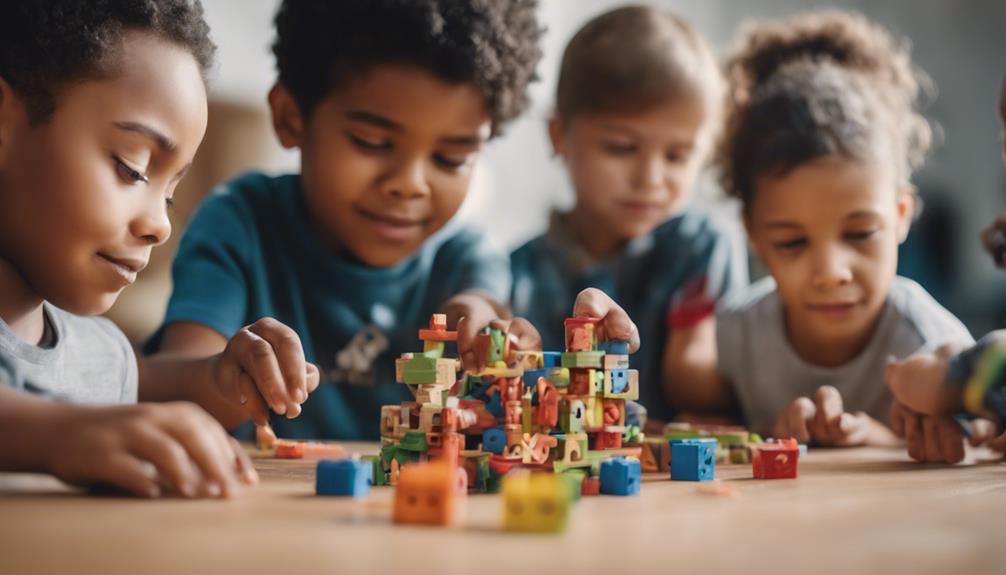
Nurturing cognitive milestones in children involves fostering a stimulating environment through interactive activities and educational resources.
To support cognitive development effectively, consider the following strategies:
- Engage your child in memory games, puzzles, and interactive play to enhance cognitive skills.
- Provide educational toys and books to create a learning-rich environment that promotes cognitive growth.
- Encourage imaginative play, ask open-ended questions, and read together to help your child reach cognitive milestones.
Frequently Asked Questions
How Do You Promote a Child's Cognitive Development?
To promote a child's cognitive development, engage in interactive play like peek-a-boo. Introduce colors, shapes, and simple directions. Encourage imaginative play, simple puzzles, and storytelling. Practice counting, basic math, and decision-making skills. Offer choices, involve in chores, and promote creativity.
What 3 Factors Can Strengthen a Child's Cognitive Development?
To enhance your child's cognitive development, focus on providing an enriching environment, ensuring stable relationships, and prioritizing quality sleep. These factors play a vital role in nurturing your child's growing mind and abilities.
Which Activity Would Best Promote Cognitive Development for a Child?
Engaging in interactive games like memory challenges can boost cognitive development in children. These activities enhance attention span, problem-solving skills, and visual perception, fostering growth in deductive reasoning and critical thinking abilities.
How Can Educators Support Children's Cognitive Development?
To support children's cognitive development, you can engage them in hands-on activities like puzzles and critical thinking challenges. Encourage open-ended questioning, memory games, and problem-solving tasks. Stimulate growth by fostering exploration, experimentation, and observation.
Conclusion
In summary, nurturing cognitive milestones in children is vital for their overall development. By providing a stimulating environment, enhancing problem-solving skills, and fostering critical thinking abilities, parents and educators can support children in reaching their full potential.
Remember, 'Rome wasn't built in a day' – progress takes time, patience, and consistent effort.
With the right support and opportunities, children can achieve significant cognitive milestones that will benefit them throughout their lives.


